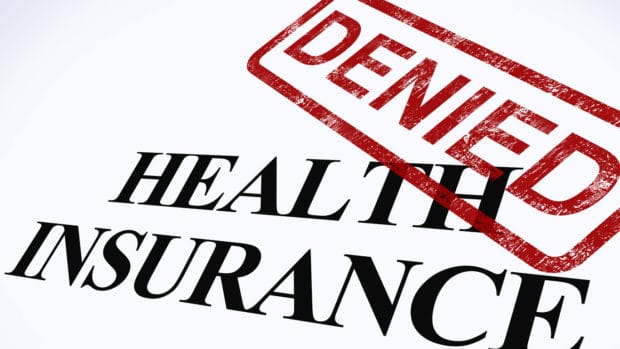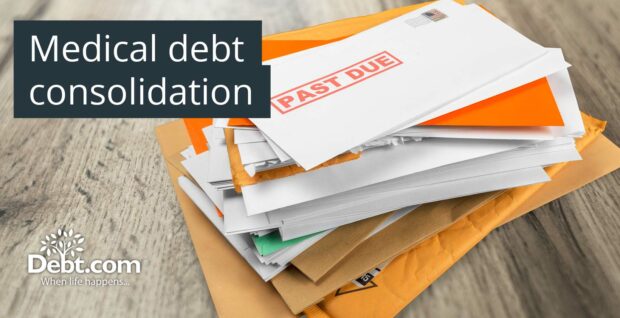
When you receive a bill for your medical treatments, it’s not a medical debt – yet. If you ignore this bill for long enough, it will go to a debt collector. While the Consumer Financial Protection Bureau has announced a new rule that medical debt can no longer affect your credit, you still want to try your best to stop the bills before they get there. If a collections notice for a past due medical bill has you shaken up, don’t feel alone.
Debt.com’s most recent medical debt survey reveals more than half (56 percent) of respondents who had medical debt said it ended up in collections.

“Medical debt is over half of all collection accounts, so it’s a huge problem,” says Gerri Detweiler, credit expert and Debt.com contributor. “There’s no easy, straightforward solution.”
Below we explore the options you have once your medical debt gets to collections.
When medical bills go to collections
Medical bills have a due date by which you must pay them. Sometimes, this is extended by your provider to give you more time to pay. “I talked to providers who don’t want bad reviews written about them online,” says Deb Gordon, author of “The Health Care Consumer’s Manifesto.” “So if you send someone to collections and you’re the provider, that person might get angry and tell a few friends – or the world by social media – what happened. I think that holds a lot of providers in check.”
But if you the due date is no longer extended, the bill will go to collections after 90 to 180 days of non-payment.
Once a medical bill is in collections, it becomes medical debt. While medical debt can no longer affect your credit score per the CFPB rule, it doesn’t mean you are off the hook. You could face legal action to recover the outstanding debt.
If a lawsuit is successful, a court may order the garnishment of wages, meaning a portion of the patient’s paycheck will be automatically deducted to pay the debt. Additionally, liens can be placed on a your property, like your home or vehicle, or on your bank accounts, restricting your ability to sell or access those assets.
Avoiding medical collections
Keep your healthcare bill out of collections so it never becomes medical debt. Start with these steps:
Ask for an itemized bill
Examine every line item on your bill. Did you receive every procedure or medication listed? Does everything seem correct? Don’t be afraid to ask questions or seek clarification. If you catch a mistake now, it will save you money and time later.
Make sure your insurance covers everything you’re entitled to
Call your insurance company if you suspect they should be covering more than what your bill shows. You may owe less than you think.
Keep track of all your documents
The more information you have on your side, the better. If you’re charged for something inaccurate, you should have the original document to prove it.
Ask your healthcare provider about a payment plan

You may be able to work out a system of monthly payments directly with your doctor’s office. This helps you pay down your bill over time and prevents your account from going to collections.
Ask about a medical credit card
Some healthcare offices offer medical credit cards. These allow you to charge your bill on credit and pay it off over time. Usually, they have an introductory period with a zero percent interest rate. However, the interest is typically deferred. Pay off everything you owe in this 6- to 12-month period or risk getting all the interest charges at once.
Find out if you qualify for an income-driven hardship plan
Depending on your income level, you may be eligible for a payment plan with monthly charges calculated according to your income. Ask your provider if this is something they offer.
Are you eligible for Medicaid?
If you have a low income, you could qualify for Medicaid. This could help you cover your medical expenses, so check to see if you meet the requirements.
This page from HealthCare.gov can help you determine your eligibility.
What should I do?
Negotiate
You may be able to negotiate with the collector to pay less than what you owe. Explain your situation and come up with an amount you could reasonably pay. Be polite but firm – this is your financial future.
Payment plan
You could also ask the debt collection agency about a payment plan. Then you pay the collector monthly until your medical debt is fully paid off.
Know your rights with debt collections
“There’s not always a simple path to [medical debt] answers for consumers, other than to exercise your rights under the FDCPA,” Detweiler says.
The Federal Debt Collection Practices Act (FDCPA) sets strict rules for how collectors can behave. It includes regulations concerning the validation of your debt, collector harassment, and more.
Check to see if you are within the statute of limitations
If your debt is within the statute of limitations, it means you can still be sued for what you owe. Before you pay anything, make sure the debt is within this time period.
Will this affect my credit?
Per the new CFPB rule, medical debt can not affect your credit report and credit score. The new ruling won’t go into effect until March 8th, 2025. Be aware that this new rule will most likely be challenged in court, and the new admiration could try to reverse the ruling.
How to file a dispute with credit agencies
If you notice a medical collections account on your credit report is incorrect before then, you can dispute the item. There are three main methods of filing a dispute.
First, you can dispute with the credit bureaus directly online. Every bureau has its own disputes page:
- Equifax: https://www.equifax.com/personal/credit-report-services/credit-dispute/
- Experian: https://www.experian.com/disputes/main.html
- TransUnion: https://www.transunion.com/credit-disputes/dispute-your-credit
Second, you can dispute via snail mail. The Federal Trade Commission (FTC) recommends this method.
Video Transcript
If you need to file a credit dispute, the FTC recommends doing it by snail mail…
Before you put your letter in the mailbox, follow these 6 rules:
- Details on top for easy reference.
Personal information and item(s) you’re disputing should be on top.
- Make sure it’s readable.
It’s better to type and print it out instead of writing by hand.
- Be concise.
Clearly explain your dispute in as few words as possible.
- Documentation is key.
Include copies of records that show the item is incorrect.
- Send by registered mail, return receipt requested.
You can be certain that the bureau received the letter.
- Keep everything.
Hold onto all records and correspondences for future reference.
Third, you can dispute the inaccurate item with the data furnishers. This means contacting the debt collection agency directly about the account with the error.
To learn more about filing a credit dispute, start here.
Our debt experts can help you find the best medical debt relief solution for your situation.
Explore medical debt relief options
If you’re having trouble paying your medical debt in collections, there are many ways to find relief. Here are a few:
Debt settlement

When you settle medical debt, you make an agreement with the collector to pay less than what you owe. It will help you get out of debt, but you’ll still have to make monthly payments and it will hurt your credit.
Bankruptcy
Bankruptcy isn’t always bad. Though it seems like a last resort, it can give you a financial clean slate if you know you will never be able to pay off your medical debt.
Credit counseling
You can talk to a certified credit counselor if you need help deciding which medical debt relief solution is best for you. Many agencies are nonprofits, so the initial consultation is completely free.
Debt management program (DMP)
A DMP helps you pay off everything you owe. However, you can’t enroll in the program solely for medical debt. You must enroll primarily for credit card debt. Then, your credit counselor will walk you through the program.
Get medical collections off your credit report
Since the new ruling form the CFPB doesn’t go into effect immediately, and will likely be challenged, you may still need to get medical collections off your credit report.
A collections account usually stays on your credit report for seven years. With each year that passes, the negative effect on your score lessens. Still, it’s not something you want hanging around and damaging your credit. Here are a few ways to get it off your report.
Ask for proof
Before you do anything, ask the collector for proof of the debt. They must send you validation, which you can keep for your records. This will also tell you whether the debt is real, or you were being scammed.
Ask how old the debt is
Once it’s seven years old, it will fall off your credit report. You may not have long to go. Waiting could be your best (and easiest) option.
Get your insurance to pay
Maybe your health insurance company was supposed to pay for a procedure and the bill slipped through the cracks, landing in collections. If this is the case, contact your insurance company about the debt. Medical collections accounts paid by insurance are immediately removed from your credit report.
Pay it off yourself
The faster you pay off this debt, the better it will be for your credit. It will still be listed in your report as a collections account, but the status will be listed as paid in full. This is better than having an outstanding collections accounts that are unpaid. If you can afford to pay it off in a lump sum, do it.
What about pay for delete?
Those who pursue debt settlement may want to try the “pay for delete” method of removing a medical collections account from their credit report. However, this is an unreliable method. Instead, it may be better to negotiate to have your account listed as “paid in full” instead of “settled.”
Be wary of scams
Unfortunately, there are many scammers willing to take advantage of vulnerable people with high medical bills. Always validate your debt before you agree to pay it. If you get too-good-to-be-true offers for cheap debt settlement, don’t trust them without doing your research.












